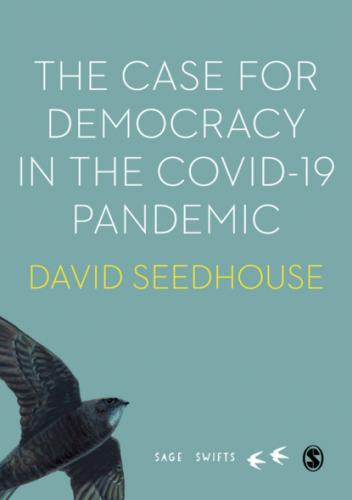The Case for Democracy in the COVID-19 Pandemic. David Seedhouse, Dr.
Consensus view on behavioural and social interventions
Date: 16th March 2020.
1 It was agreed that a combination of case isolation, household isolation and social distancing of vulnerable groups is very unlikely to prevent critical care facilities being overwhelmed.
2 It was agreed that it is unclear whether or not the addition of general social distancing measures to case isolation, household isolation and social distancing of vulnerable groups would curtail the epidemic by reducing the reproduction number to less than 1.
3 It was agreed that the addition of both general social distancing and school closures to case isolation, household isolation and social distancing of vulnerable groups would be likely to control the epidemic when kept in place for a long period. SPI-M-O agreed that this strategy should be followed as soon as practical, at least in the first instance. (25)
Not wishing to be unkind, this reads like ‘everything is unclear, apart from our own decisions'.
As Ed Yong wrote in The Atlantic on April 29th:
In a pandemic characterized by extreme uncertainty, one of the few things experts know for sure is the identity of the pathogen responsible: a virus called SARS-CoV-2 that is closely related to the original SARS virus. Both are members of the coronavirus family, which is entirely distinct from the family that includes influenza viruses. Scientists know the shape of proteins on the new coronavirus's surface down to the position of individual atoms. Give me two hours, and I can do a dramatic reading of its entire genome.
But much else about the pandemic is still maddeningly unclear. Why do some people get really sick, but others do not? Are the models too optimistic or too pessimistic? Exactly how transmissible and deadly is the virus? How many people have actually been infected? How long must social restrictions go on for? Why are so many questions still unanswered?
The confusion partly arises from the pandemic's scale and pace. Worldwide, at least 3.1 million people have been infected in less than four months. Economies have nose-dived. Societies have paused. In most people's living memory, no crisis has caused so much upheaval so broadly and so quickly. ‘We've never faced a pandemic like this before, so we don't know what is likely to happen or what would have happened,’ says Zoë McLaren, a health-policy professor at the University of Maryland at Baltimore County. ‘That makes it even more difficult in terms of the uncertainty.'… (26)
So much is in doubt. Apart from the fact that human beings hate uncertainty. We are hard-wired to resist it:
…when we're facing outcomes imbued with uncertainty, it's the fact that something bad might happen that gets us… (27)
In a recent experiment (28), researchers recruited 45 volunteers to play a computer game designed to maintain a high level of uncertainty. Participants had to guess whether each rock concealed a snake. When a snake appeared, they received a mild but painful electric shock on the hand.
In the background, the researchers were running a sophisticated computational learning model to estimate the volunteers’ amount of uncertainty that any given rock was concealing a snake. At the same time, their stress was being monitored via instruments gauging pupil dilation and perspiration.
The volunteers’ level of uncertainty was directly correlated to their stress level: if someone felt sure he would find a snake their stress was significantly lower than if they felt maybe a snake lived here. The physical pain wasn't the greatest problem. It was not knowing that was most damaging (29, 30, 31).
As David diSalvo, a science and technology writer, notes:
We evolved to respond this way to uncertainty for excellent reasons—namely, the thing that might be lurking behind that rock or bush or up in that tree could harm, kill, or quite possibly eat us. Our brains are adaptively wired to react this way from way, way back in our ancestral history. Just because we've launched ourselves (and our brains) into this techno-socially advanced era doesn't mean our brains are reacting less or even differently; they are just reacting to different threatening possibilities—some physical and many more perceptual.
Those perceptual, intangible uncertainties are arguably worse because they morph into different forms in our heads the more we think about them. The world has its monsters, no doubt, but we create many times more in the boundless space of our minds … all rooted back to the brain's insatiable craving for certainty. (32)
The potent fear of COVID-19 stems essentially from uncertainty. We don't know who will get it. We don't know what will happen if we do get it. We don't know which of our neighbours has it. We don't know how many fellow shoppers in the supermarket might infect us. We don't know whether we will pass it on if we visit elderly relatives. We don't know why some nations in lockdown (Spain, Italy, the UK) end up with more cases and deaths than those with more relaxed measures (Sweden). Each time we read the news we have no idea what the next shock will be.
Psychology does not have all the answers, but it can help us understand how we feel and why we react as we do. And it can partially explain the behaviours of the people currently charged with making decisions on our behalf. It makes sense to start the investigation here.
Конец ознакомительного фрагмента.
Текст предоставлен ООО «ЛитРес».
Прочитайте эту книгу целиком, купив полную легальную версию на ЛитРес.
Безопасно оплатить книгу можно банковской картой Visa, MasterCard, Maestro, со счета мобильного телефона, с платежного терминала, в салоне МТС или Связной, через PayPal, WebMoney, Яндекс.Деньги, QIWI Кошелек, бонусными картами или другим удобным Вам способом.
